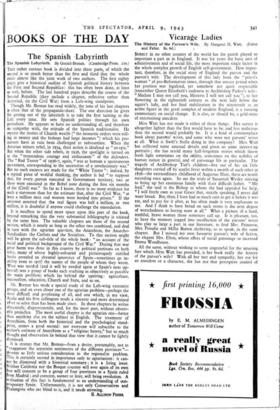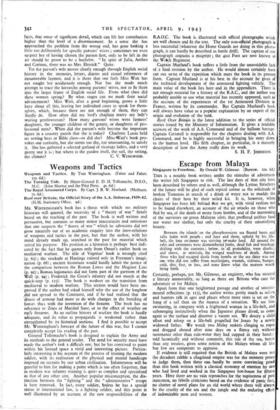Vicarage Ladies
The History of the Parson's Wife. By Margaret H. Watt. (Faber and Faber. 6d.)
SURELY in no other country of the world has the parish played so important a part as in England. It was for years the basic unit of
administration and of social life, the most important single factor in the whole complex growth of English self-government. How important, therefore, in the social story of England the parson and the parson's wife. The development of this lady from the "priest's V. oman " of pre-Reformation times, through that uneasy period when her position was legalised, yet somehow not quite respectable (remember Queen Elizabeth's rudeness to Archbishop Parker's wife: "Madam I may not call you, Mistress I will not call you "), to her flowering in the eighteenth century as the next lady below the squire's lady, and her final stabilisation in the nineteenth as an active figure in the great complex of modem England, is a running commentary on social change. It is also, or should be, a gold-mine of entertainmg anecdote.
Miss Watt has not made it either of these things. Her survey is altogether lighter than the first would have to be, and less malicious than the second would probably be. It is a kind of commonplace book about parsdns' wives, and some who were not parsons' wives at all. What is Swift's Stella doing in this company? Miss Watt has collected some unusual details and given us some interesting portraits • she has retold many half-forgotten stories which throw fresh light sometimes on the oddity, sometimes on the nobility of human nature in general, and of parsonage life in particular. The tragedy of Archbishop Tait's children—five out of his six little -daughters carried off by scarlet fever within a month of each other in 1856—the extraordinary childhood of Augustus Hare, these are worth recording once again. So are the trials of Susannah Wesley striving to bring up her enormous family with tt.eir difficult father. "My lord," she said to the Bishop to whom she had appealed for help, "I will freely own to your Grace that, strictly speaking, I never did want bread. But, then, I have had so much care to get it before it was eat, and to pay for it after, as has often made it very unpleasant to me. And I think to have bread on such terms is the next degree of wretchedness to having none at all." What a picture of a hard, truthful, brave woman those sentences call up. It is pleasant, too, to have the memory jogged into recollection of the parsons' wives who play so large a part in our literature, to find Mrs. Primrose, Mrs. Proudie and Millie Barton sheltering, so to speak, in the same chapter. But I missed my own favourite parson's wife of fiction, the elegant Mrs. Elton, whose offers of social patronage so incensed Emma Woodhouse.
All the same, without wishing to seem ungrateful for the amusing fare which Miss Watt has provided, is her book really the history of the parson's wife? With all her tact and sympathy, her eye for an anecdote or a character, she has not that perceptive control of
facts, that sense of significant detail, which can lift her contribution higher than -the level of a divertissement. In a sense she has approached the problem from the wrong end, has gone looking a little -too deliberately for specific parsons' wives ; sometimes we even suspect her of having chosen the parson first, only to be left in the air should he prove to be a bachelor: "In spite of Julia, Anthea and Corinna, there was no Mrs. Herrick." Quite.
Yet the parson's wife moves clearly enough through English social history in the memoirs, letters, diaries and casual references of innumerable laymen, and it is there that one feels Miss Watt has not sought her assiduously enough. Nor has she made much attempt to trace the hierarchy among parsons' wives, nor to fit them into the larger frame of English social life. From what class did these women spring? By what, stages can we mark their social advancement? Miss Watt, after a good beginning, grows a little hazy about all this, leaving her individual cases to speak for themselves, which, because there are not enough of them, they 'can Hardly do. How often did my lord's chaplain marry my lady's viaiting gentlewoman? How many parsons' wives were farmers' daughters, the younger children of the gentry, or daughters of professional men? When did the parson's wife become the important figure in a country parish that she is today? Charlotte Lucas held no sewing bees or Bible class—or did she? Miss Watt's book provokes our curiosity, but she seems too shy, too unassuming, to satisfy it. She has gathered a selected garland of vicarage ladies, and a very pretty one it is ; but where is the garden itself, thesoil, the setting,
the climate? C. V. WEDGWOOD.























 Previous page
Previous page